-
PROVIDERS
Register now
Are you getting the full picture? A webinar series on the power of comprehensive intelligent diagnostics
-
LIFE SCIENCES
Enroll now
Tempus’ Patient-Derived Organoid ScreensEvaluate the efficacy of your preclinical compounds using fixed organoid panels designed for diverse therapeutic applications. Space is limited — enroll by June 30, 2025, to secure your spot.
-
PATIENTS
It's About Time
View the Tempus vision.
- RESOURCES
-
ABOUT US
View Job Postings
We’re looking for people who can change the world.
- INVESTORS

CARE PATHWAY intelligence SOLUTIONs
Tempus Next Cardiology
AI-enabled care pathway platform to help clinicians find patients with undiagnosed or undertreated cardiovascular or pulmonary disease. Tempus Next ingests multimodal data, runs AI-based algorithms, and surfaces insights for care teams to evaluate and action on.
Improve adherence to clinical guidelines through AI-enabled and targeted notification at the point of care for diagnostic and treatment decision support.
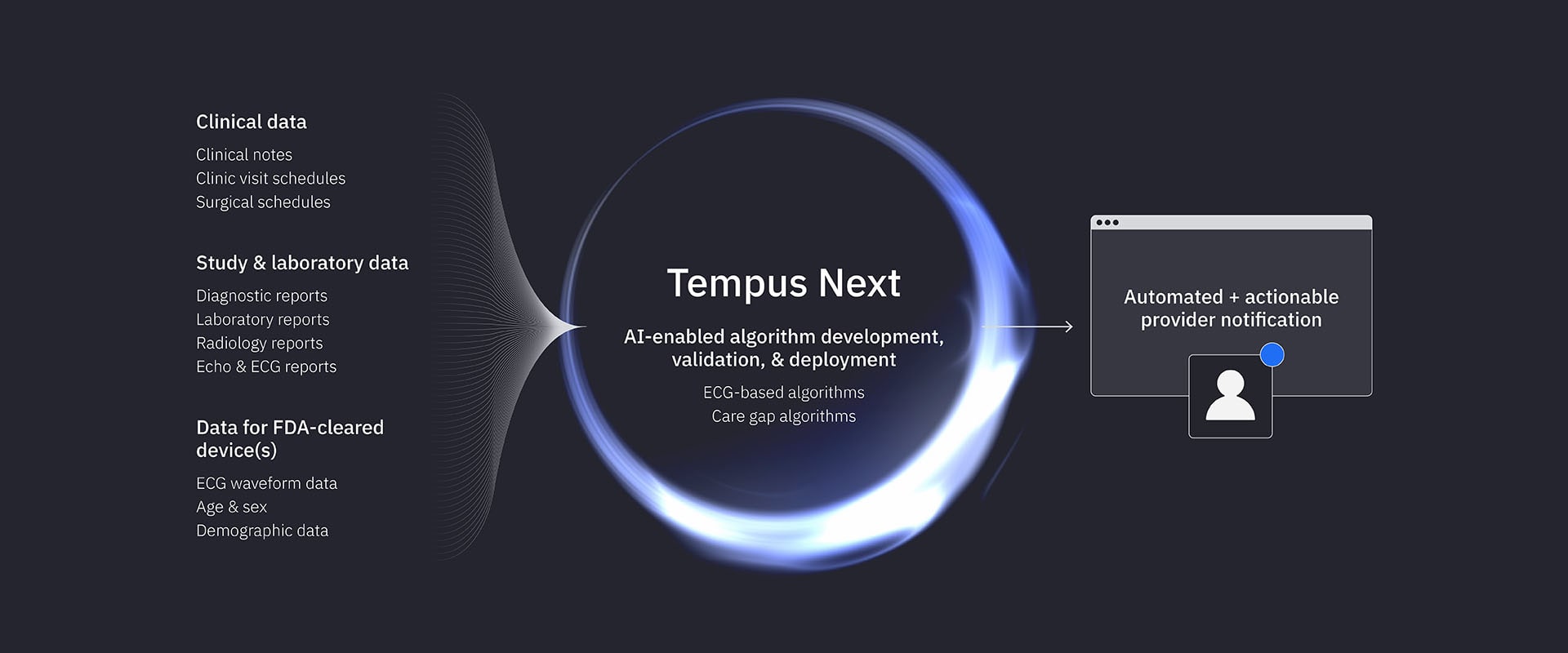
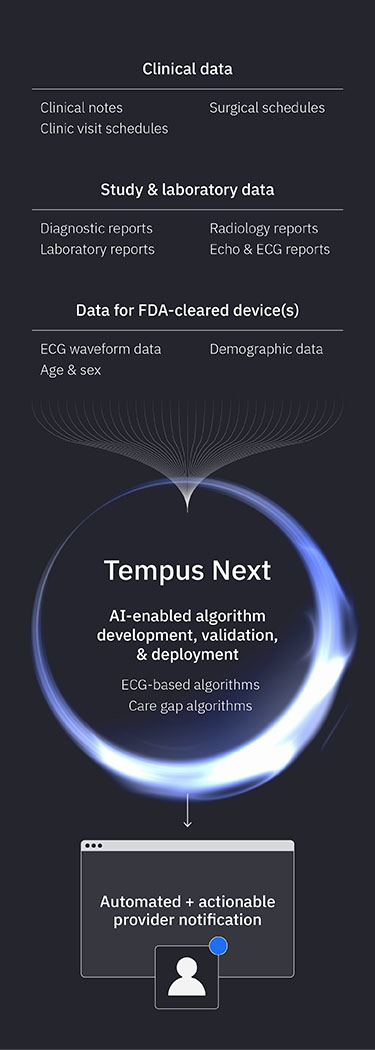
Our PARTNERSHIPS
Accelerating cardiac therapy breakthroughs with AI through algorithm development, validation and scaled clinical adoption
We bring AI based algorithms through FDA clearance.
With deep regulatory experience, we are expanding our algorithms across 15+ disease areas in cardiology.
We are pursuing development and clearance of AI-based cardiology algorithms as “cardiovascular machine learning-based notification software”. These algorithms can analyze physiological inputs using machine learning models, and suggest the likelihood of a cardiovascular disease or condition for further referral or diagnostic follow-up.
Read more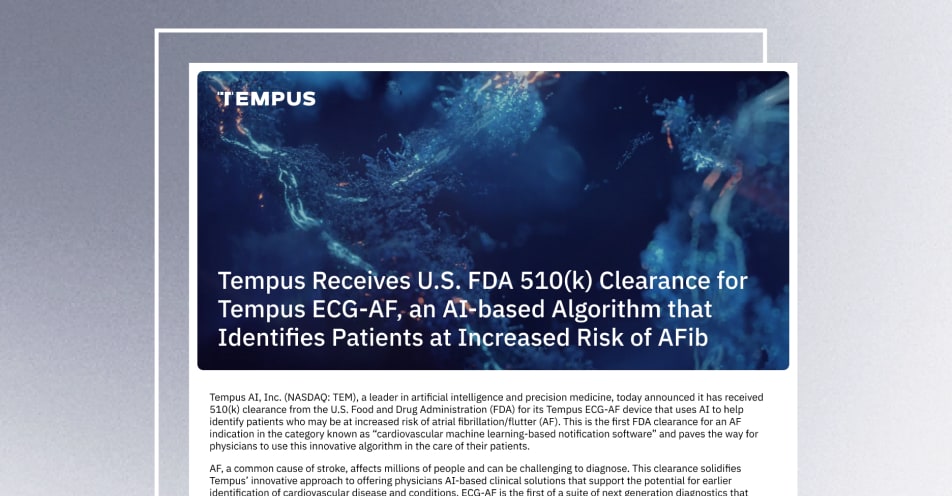
We develop algorithms in partnership with industry leader to identify patients at risk of undiagnosed disease.
Tempus can lead multi-site studies of investigational AI-based cardiology algorithms, and facilitate these studies using our Tempus Next software. We can support evaluation of clinical use and timely clinical detection of cardiac events, and track clinical outcomes. These studies can provide evidence to support development, publication, regulatory, reimbursement and clinical adoption goals.
The algorithm is investigational, has not received approval or clearance from the U.S. Food and Drug Administration, and at this time is not available for clinical use.
Read more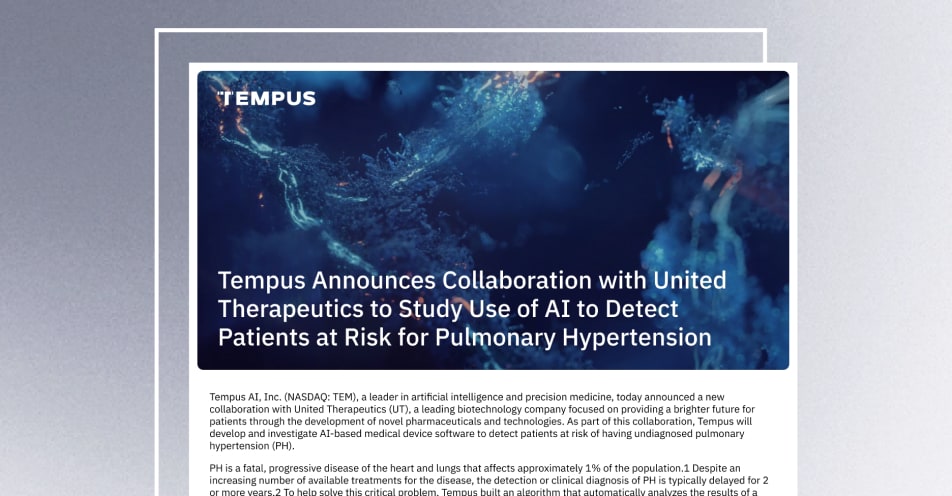
We deploy algorithms across our network.
Tempus care gap algorithms help find undiagnosed or undertreated disease and close gaps in care at scale.
- 350+ EHR connected health systems across 2,000+ hospitals
- 100+ hospitals nationwide are currently powered by Tempus Next
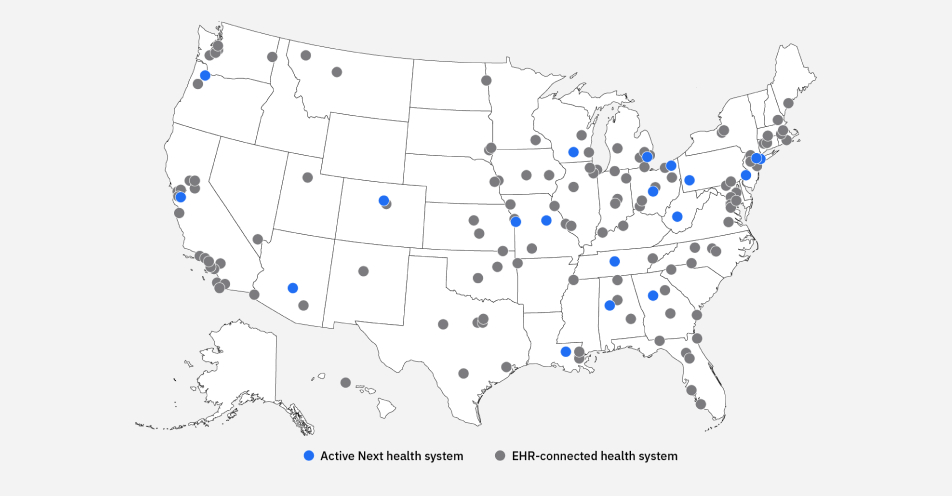
We increase equitable access to cardiology care and reduce disparities.
Tempus helps clinicians with timely and accurate diagnostics, procedures, and therapies for all patients, regardless of socioeconomic status.
Figure: In this study, black patients saw a larger decrease in average time from index echo to follow-up (120 to 64 days) compared to white patients (57 to 36 days). This shows the improvement in black patients’ time to follow-up towards the average of all patients (narrowing the gap).
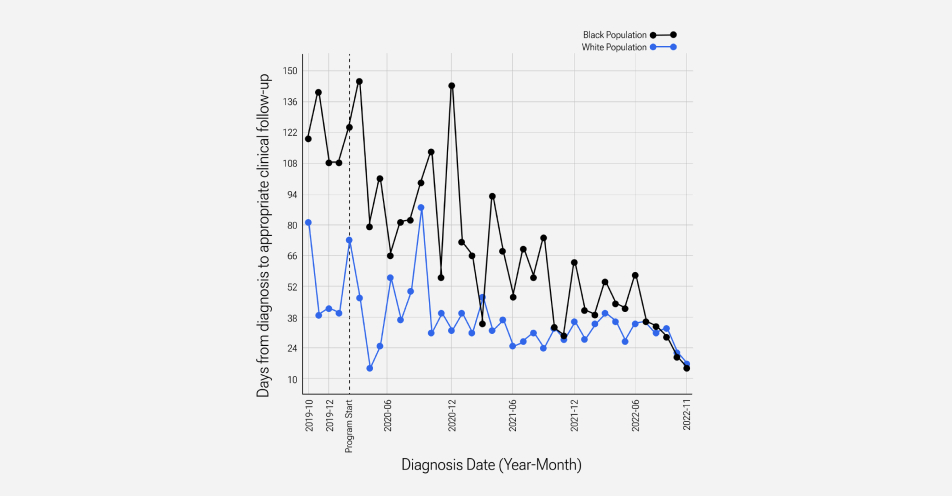
Our impact ON PATIENT CARE
-
60+
algorithms to identify potential care gaps across 15 cardiovascular diseases
-
~2M
patients screened
-
50K+
patients screened per month

Case Study
Identifying patients with valvular heart disease: A partnership between St. Francis and TempusLearn how the deployment of Tempus Next, an AI-enabled clinical care pathway solution, at a specialty designated cardiac and heart valve center helped enable guideline directed care for patients with structural heart disease.
LEARN MORE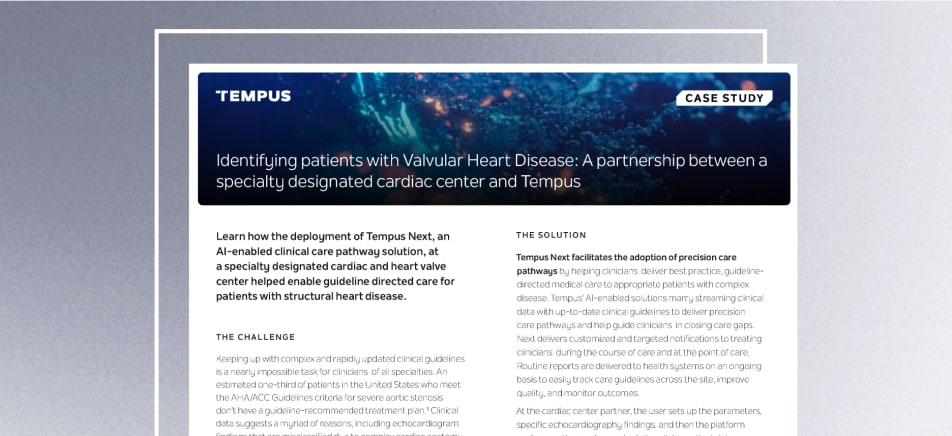
Case Study
Revolutionizing cardiac care: AI-driven detection and treatment of critical heart valve disease at Boulder Community HealthDiscover how Tempus Next’s AI-powered care pathway platform transformed patient outcomes by helping ensure timely, guideline-directed treatment for critical heart valve disease at Boulder Community Health.
LEARN MORE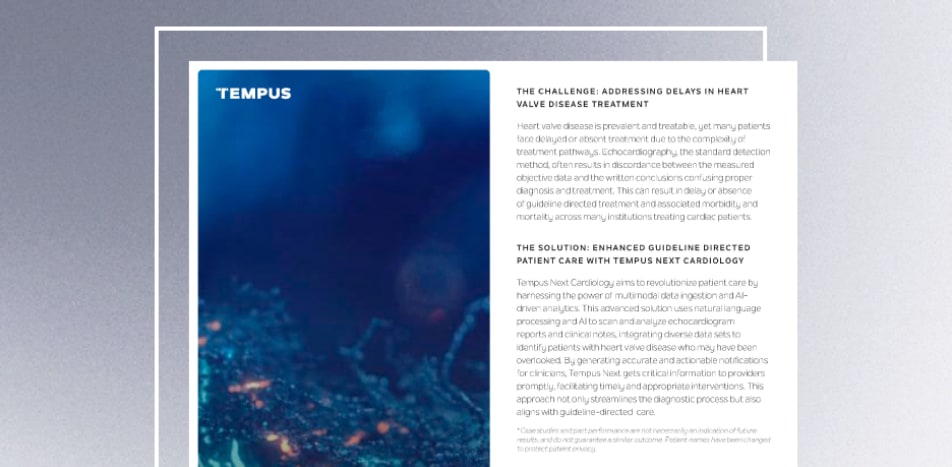
Case Study
Addressing health disparities at a large academic medical center: AI-driven cardiac care for aortic stenosis and mitral regurgitationLeveraging a natural language processing (NLP) based, artificial intelligence (AI) driven protocol, Tempus Next worked to help clinicians improve management of patients with severe aortic stenosis (sAS) and severe mitral regurgitation (sMR) by identifying patients who may have been previously overlooked.
LEARN MORE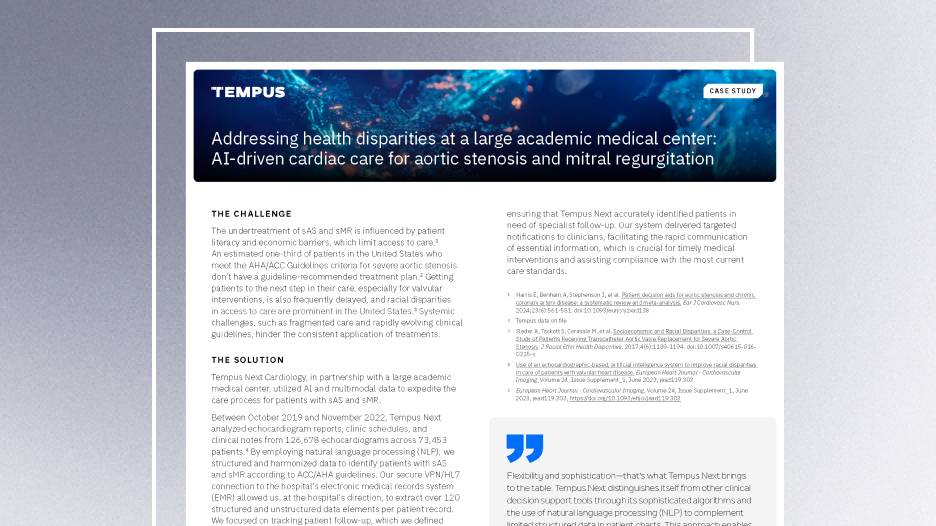
Predictive ECG Algorithms for Undiagnosed Disease
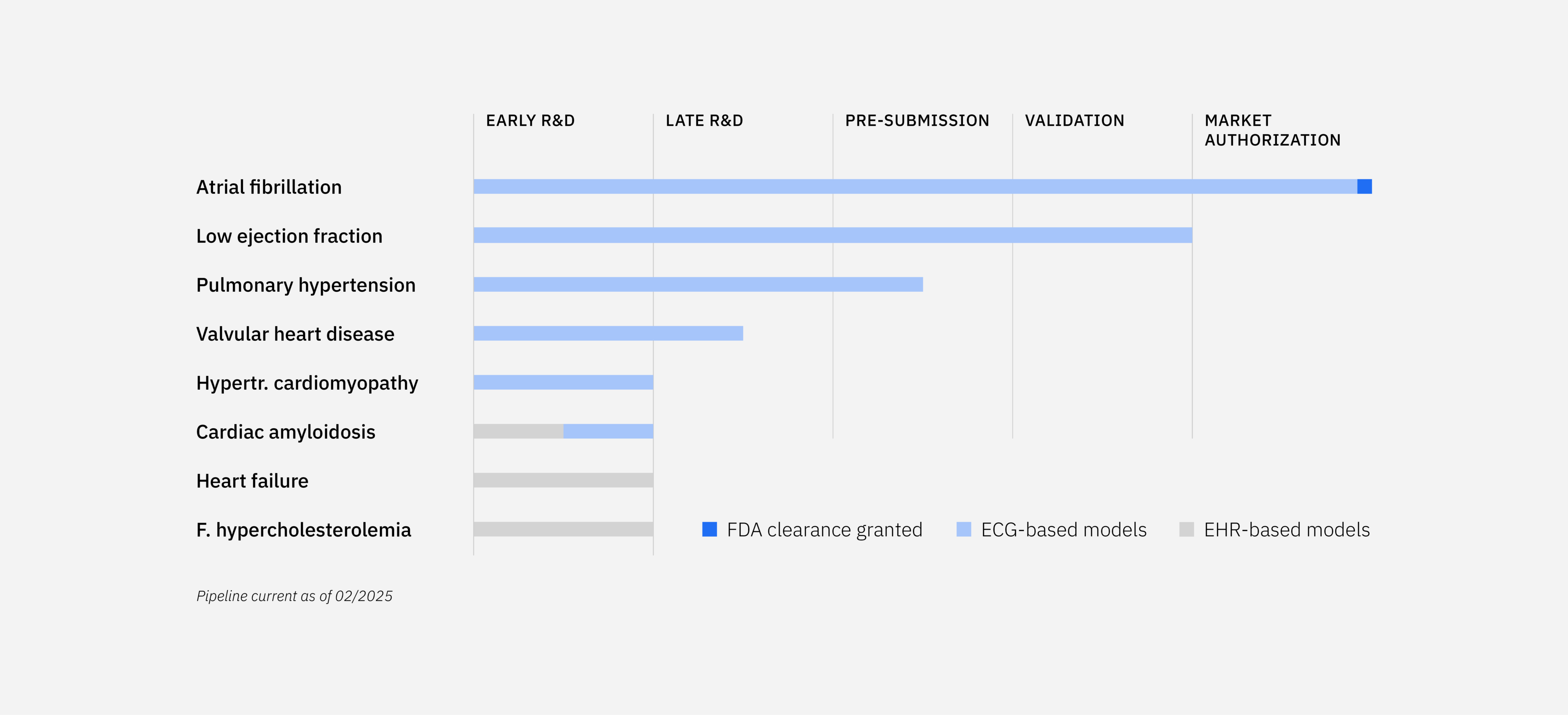
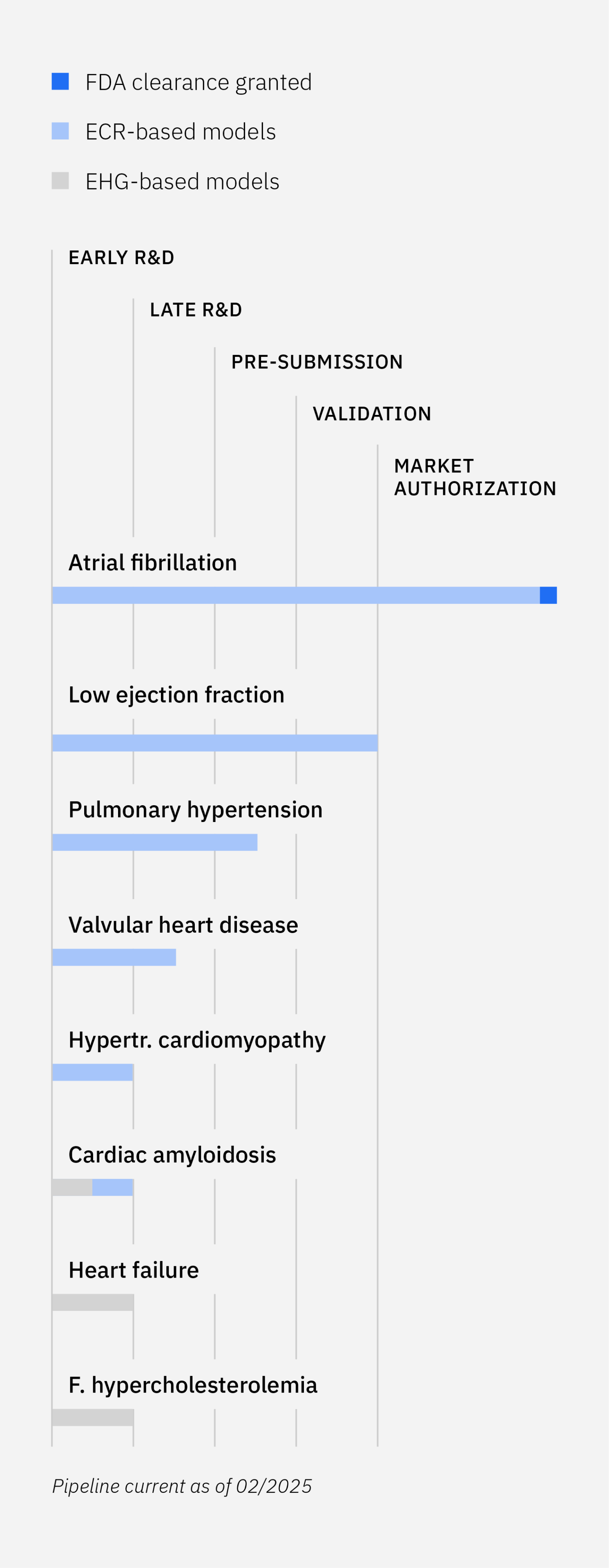
-
UPCOMING WEBINAR:
Tempus Receives U.S. FDA 510(k) Clearance for Tempus ECG-AF, an AI-based Algorithm that Identifies Patients at Increased Risk of AFib
Tempus AI, Inc. (NASDAQ: TEM), a leader in artificial intelligence and precision medicine, today announced it has received 510(k) clearance from the U.S. Food and Drug Administration (FDA) for its Tempus ECG-AF device that uses AI to help identify patients who may be at increased risk of atrial fibrillation/flutter (AF).
Read more -
UPCOMING WEBINAR:
Tempus Announces Collaboration with United Therapeutics to Study Use of AI to Detect Patients at Risk for Pulmonary Hypertension
Tempus AI, Inc. (NASDAQ: TEM), a leader in artificial intelligence and precision medicine, today announced a new collaboration with United Therapeutics (UT), a leading biotechnology company focused on providing a brighter future for patients through the development of novel pharmaceuticals and technologies.
Read more
Our Science
view all-
UPCOMING WEBINAR:
A Novel Phenotyping Pipeline to Improve Identification of Patients with Pulmonary Hypertension in Electronic Health Records
05/22/2024
Read more -
UPCOMING WEBINAR:
ECG-based Machine Learning Model Identifies Patients at High Risk for Incident Pulmonary Hypertension
05/22/2024
Read more -
UPCOMING WEBINAR:
Structured EHR Data Underestimates Prevalence and Misses Large Proportions of Patients with Pulmonary Hypertension
05/22/2024
Read more -
UPCOMING WEBINAR:
Predictors of Disease Progression and Adverse Clinical Outcomes in Patients With Moderate Aortic Stenosis Using an Artificial Intelligence-Based Software Platform
05/22/2024
Read more -
UPCOMING WEBINAR:
Large Language Models with Retrieval-Augmented Generation for Zero-Shot Disease Phenotyping
12/11/2023
Read more
- Sudden Cardiac Arrest Foundation. January 29, 2020. Latest statistics: 1,000 people suffer sudden cardiac arrest each day in U.S.; only 10% survive [online]. Available from: https://www.sca-aware.org/sca-news/latest-statistics-1000-people-suffer-sudden-cardiac-arrest-each-day-in-us-only-10-survive [Accessed May 1, 2023]
- Husband G.; D”amico A.; Hasnie U.; Batra N.; Cochrun S.; Gann A.; Li E.; Nguyen D.; Philip George A.; Soto M.; Rogers C.; Ahmed M.; Andrikopoulou E.; UAB Hospital, Birmingham, United States of America; University of South Alabama, Mobile, United States of America; The Johns Hopkins Hospital, Baltimore, United States of America. February 2022. European Heart Journal – Cardiovascular Imaging, Volume 23, Issue Supplement_1 [online]. Available from: https://academic.oup.com/ehjcimaging/article/23/Supplement_1/jeab289.244/6522478
- J Comp Eff Res. October 2021. Healthcare utilization and guideline-directed medical therapy in heart failure patients with reduced ejection fraction [online]. Available from: https://pubmed.ncbi.nlm.nih.gov/34225473/ [Accessed May 1, 2023]
- INDICATIONS FOR USE: Tempus ECG-AF is intended for use to analyze recordings of 12-lead ECG devices and detect signs associated with a patient experiencing atrial fibrillation and/or atrial flutter (collectively referred to as AF) within the next 12 months. It is for use on resting 12-lead ECG recordings collected at a healthcare facility from patients: 65 years of age or older, without pre-existing or concurrent documentation of atrial fibrillation and/or atrial flutter, who do not have a pacemaker or implantable cardioverter defibrillator, and who did not have cardiac surgery within the preceding 30 days. Performance of repeated testing of the same patient over time has not been evaluated and results SHOULD NOT be used for patient monitoring. Tempus ECG-AF only analyzes ECG data. Results should be interpreted in conjunction with other diagnostic information, including the patient’s original ECG recordings and other tests, as well as the patient’s symptoms and clinical history. Tempus ECG-AF is not for use in patients with a history of AF, unless the AF occurred after a cardiac surgery procedure and resolved within 30 days of the procedure. It is not for use to assess risk of occurrence of AF related to cardiac surgery. Results do not describe a person’s overall risk of experiencing AF or serve as the sole basis for diagnosis of AF, and should not be used as the basis for treatment of AF. Results are not intended to rule-out AF or the need for follow-up.
Partner with us
We believe that AI-enabled solutions can improve the lives and outcomes of patients with cardiovascular disease. Learn more about co-developing and deploying algorithms with Tempus.